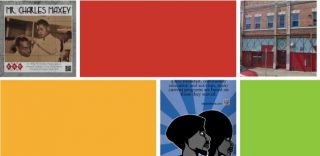
North Williams Avenue, Portland’s busiest biking street that’s full of new shops and housing, was once the heart of our city’s black community.
But due to the negative impacts of systemic racism, city policies that hurt people of color, and recent demographic shifts, Williams has changed dramatically. Some of that original culture still thrives, but it’s a shadow of its former self.
Now a public art project wants to help Portlanders remember what was lost and celebrate what exists today.
“Having engaged subjects as diverse as the civil rights movement, indigenous culture, and modernist object design, my work reproduces familiar visual signs, arranging them into new conceptually layered pieces.”
— Cleo Davis, project lead
The Black Williams Project came out of the Portland Bureau of Transportation’s efforts to make the road safer by reconfiguring travel lanes. That project sparked controversy when advisory committee members and local residents spoke up to oppose the city’s plans, demand acknowledgment of the area’s racist history and give more support to the voices of existing black residents.
The stakeholder advisory committee that ultimately came together in agreement around the project spun off a separate committee in July 2013 to find an appropriate way to honor the history of Williams Avenue. The committee had $100,000 that had been set-aside in project funds to create public art along the corridor.
According to committee member (and now retired PBOT project manager) Ellen Vanderslice, the process to select the artists was turned over to the Regional Arts and Culture Council in 2014. RACC put out a call to artists and a selection was made in November of that year.
The artists are the husband-and-wife team of Cleo and Kayin Talton Davis (read more about them via The Skanner). They own businesses and property along North Williams and grew up in neighborhood.
Advertisement
Their vision, as outlined at BlackWilliamsProject.com, is for a series of sidewalk murals, signage, and kiosks that will be installed between Broadway and Killingsworth.
Here’s more from the artists about the three artistic elements you can expect to see:
SIDEWALK MURALS
Tiles will be printed using a porcelain enamel process, then embedded into the concrete of the furnishing zone. The installation will require current concrete to be removed and replaced with tiles in the area of the artwork. A total of 10 locations are planned.
SIGNAGE
Every tile location will be highlighted by a sign. Signs will face primarily toward the sidewalk and be 12”x18” located at an average eye level.
Signs will be printed porcelain enamel on a steel substrate. Porcelain enamel is extremely graffiti resistant; it is difficult to scratch and paint or marker can be removed easily with a little Windex or acetone.FUNCTIONAL ART / KIOSK
The kiosk incorporates a touchscreen to access a variety of multimedia presentations, and additional information not presented in the tiles or signs. It will be updated as additional interviews are made, and other relevant art is created. The kiosk is intended to be installed on the NE corner of N Cook and N Williams intersection.
A community celebration will be held once the art is installed. PBOT has not released the expected date of completion, but sources say it could be as early as next month.
Learn more about the project and the artists at BlackWilliamsProject.com.
— Jonathan Maus, (503) 706-8804 – jonathan@bikeportland.org
BikePortland is supported by the community (that means you!). Please become a subscriber or make a donation today.



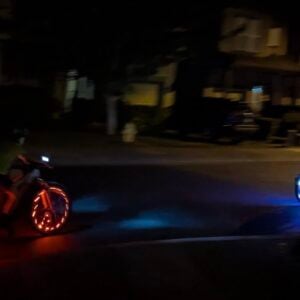
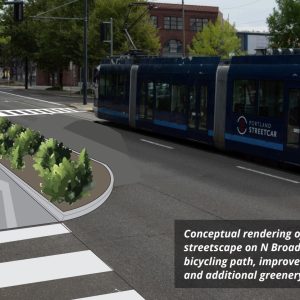
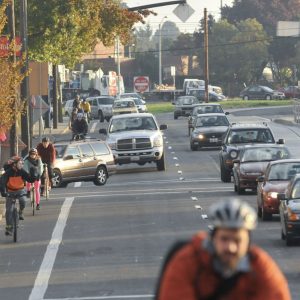
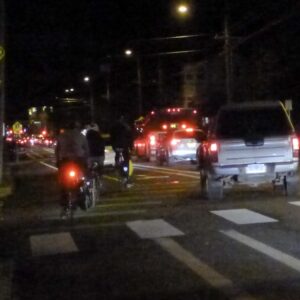
Thanks for reading.
BikePortland has served this community with independent community journalism since 2005. We rely on subscriptions from readers like you to survive. Your financial support is vital in keeping this valuable resource alive and well.
Please subscribe today to strengthen and expand our work.
Good project, good reminders. Looking forward to seeing the murals!
When do we get to honor the loss of Felony Flats in Fo-Po? I really miss the crime and cyclone fencing and guard dogs.
Huh? ???
It’s just perversely-named “All Lives Matter” rhetoric.
They’re nihilists, Donny, you have nothing to be afraid of.
I was just puzzling over how the comparatively alluded to (apparently “like”) formerly vibrant culture and community of Felony Flats ex-felons went completely unnoticed by me. Which is weird, as I’ve lived here all my life. How could I have missed it?
things like this revise (gloss over) much of the history that comes with the place. Felony flats, NE Alberta, Mississippie Ave., Williams, etc. etc. have some rough history that most of the Californians moving in have no clue about. It was not a culture mecca…it was place where the residents had to worry about getting shot almost daily.
You liken Felony Flats (Brentwood-Darlington, actually) to historic Albina, the seat of the black community in Portland? Albina was (and is) an actual community with shops, clubs, a business district. The evisceration of that community came (and comes) from some really choice, particular decisions made by (very pale) lawmakers and movers and shakers completely outside the community–not from within.
What is the history of Felony Flats by comparison? It’s not a community or cultural center. It’s a residential areas bordering Woodstock with more than it’s fair share of ex-felons who have never expressed or identified themselves collectively in the form of “community.” How does this compare to Albina? It’s an insulting comparison, and wildly amnesiacal to gloss over decades of destructive policy, disinvestment and harassment in North Portland with such a blithe dismissal.
http://www.blackpast.org/aaw/albina-portland-1870
I followed this project at those early meetings, and it had ambitious goals for placing artwork at key points along the corridor. Broadway to Killingsworth is a LONG way, and has many significant locales to acknowledge … yet the budget with RACC was 80K!?! You can barely do one nice sculpture with that budget.
Why, oh why, oh why?? Don’t be afraid to know the answer …
Does this mean the Major Taylor mural will happen?
This sounds great. Can’t wait!
I am still working on making the Major Taylor mural happen on Williams. Fingers crossed it will within a years time!